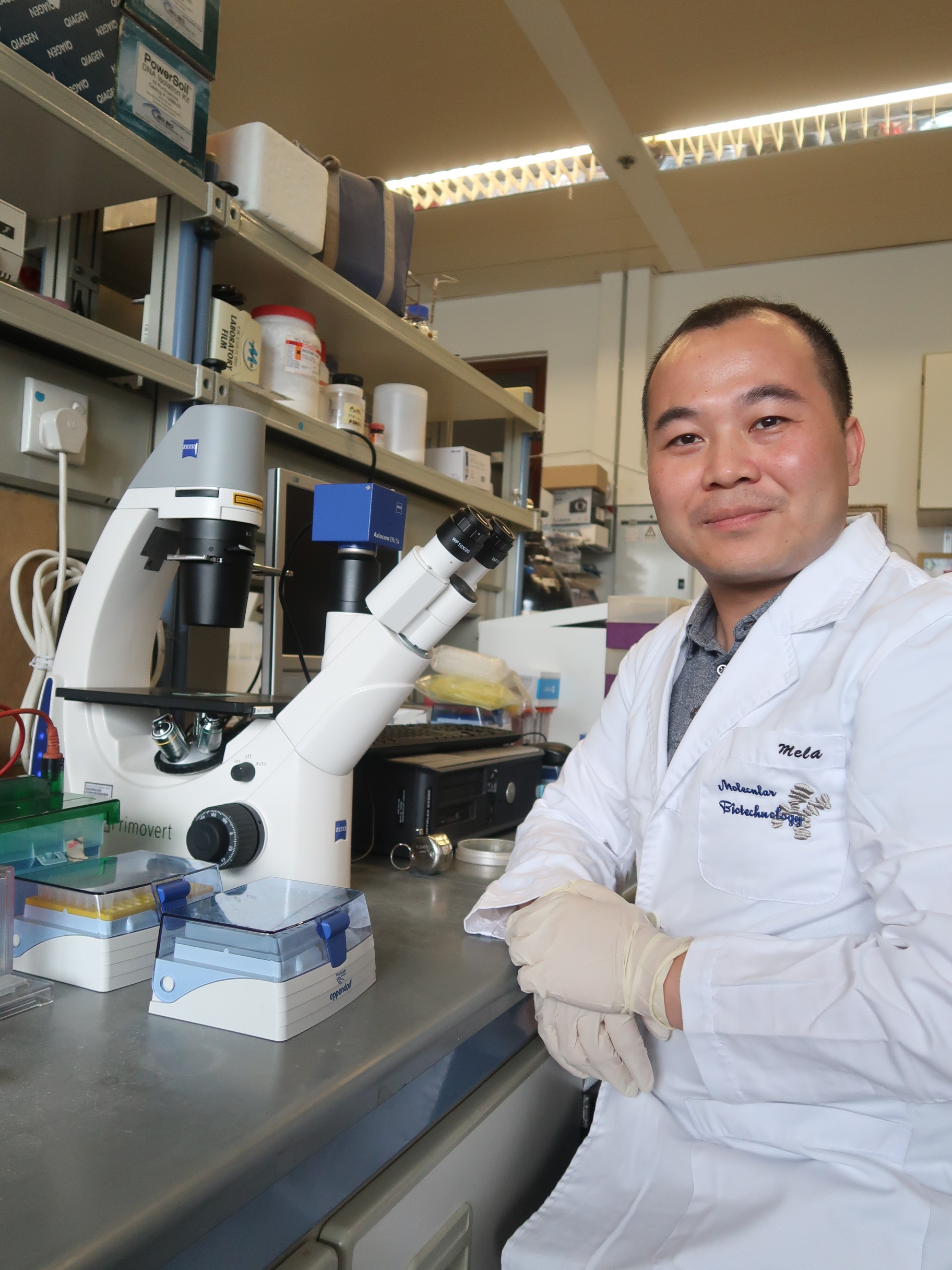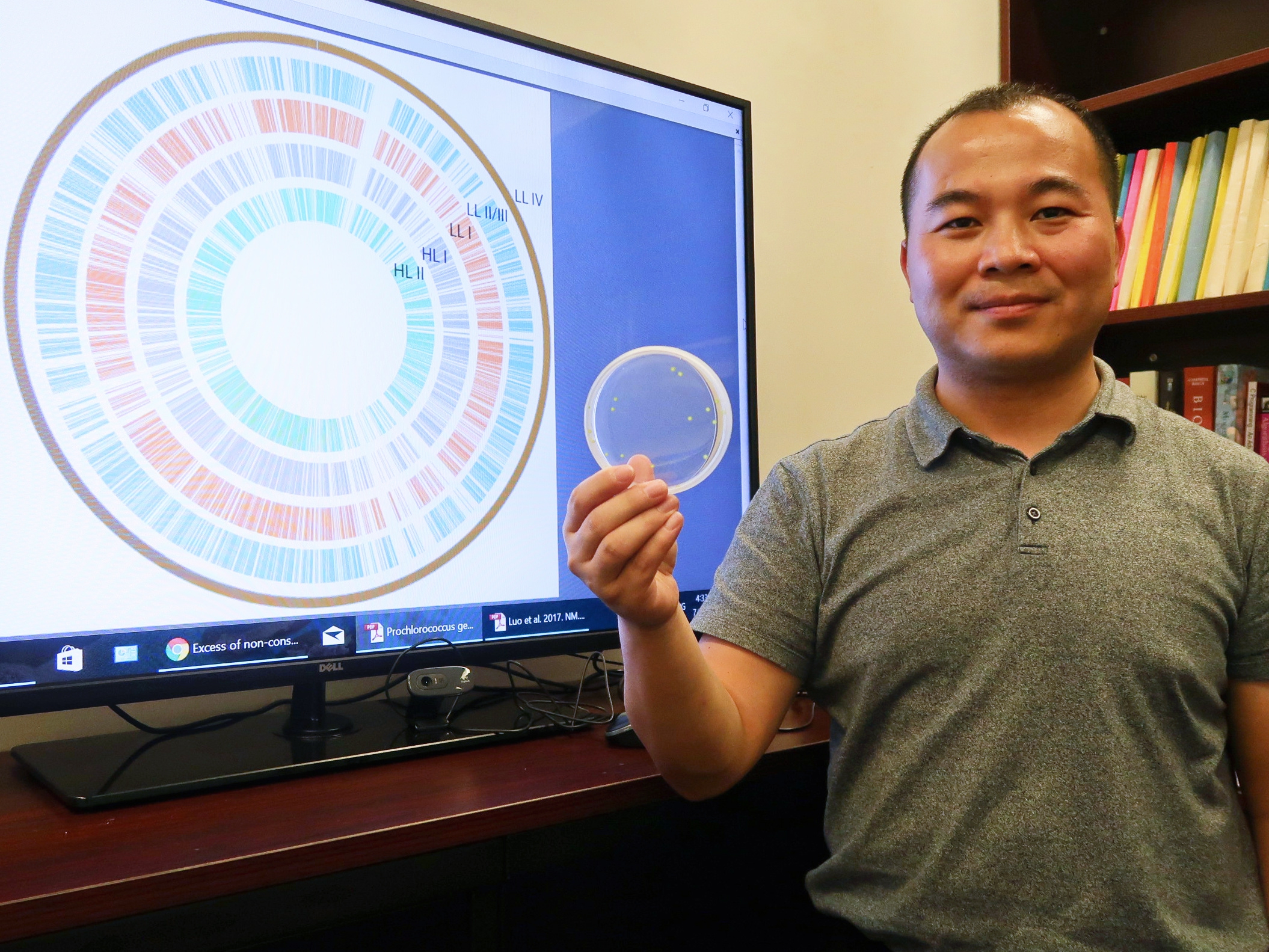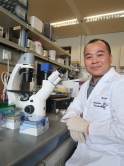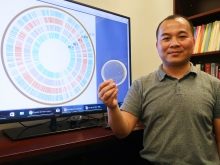News Centre
CUHK Scientists Use Tiny Marine Bacteria to Trace Earth’s History
Over the past decade, marine microbiologists and evolutionary biologists have believed that the evolutionary pattern of Prochlorococcus and other smallest marine bacteria is well explained by Darwin’s theory of biological evolution. Now, a study by Prof. Haiwei Luo, Assistant Professor at the School of Life Sciences at The Chinese University of Hong Kong (CUHK), and his research team, has overturned this. Professor Luo and his team performed genomic analyses of Prochlorococcus and other small marine bacteria with the use of super computers and identified massive DNA losses in their early evolutionary history. Their study suggests that these genomic changes were potentially the result of sudden changes, such as rapid climate changes, on Earth at that time, driving these primitive marine bacteria to slow down or even stop growing. This study involving multi-disciplinary knowledge including microbiology, evolutionary biology, marine science and computer science has been published in the latest issue of the internationally leading journal Nature Microbiology.
A drop of seawater contains millions of bacteria, most of which are only about 0.5 microns in size and are known as picoplanktonic bacteria. They are not only benign to human and larger marine organisms, but also key players in maintaining the balance of the Earth’s elemental cycle and regulating the climate. For example, 20% of the chlorophyll, the required apparatus for photosynthesis to produce oxygen on the Earth (including the ocean and the land), is synthesized by Prochlorococcus. Therefore, a sizeable portion of the oxygen we breathe is contributed by this type of picoplanktonic marine bacteria. Studying the evolution of Prochlorococcus is of paramount importance to understand how microorganisms adapt to marine environments, as well as the evolutionary history of life and the Earth.
Natural selection has been considered the main mechanism of Darwin’s theory of biological evolution, which means that the genetic characteristics of an organism are preserved or eliminated in the competition, which explains how an organism adapts to the environment. Seawater is an extremely dilute environment where nutrients are scarce, which often limits the growth of planktonic bacteria. Through long-term evolution, picoplanktonic bacteria including Prochlorococcus lost a large number of DNA molecules. This phenomenon was interpreted as the major way that marine bacteria take to adapt to the oligotrophic seawater, because having less DNA can save much energy and material in biosynthesis and also reduce the cell volume, thereby increasing the surface-to-volume ratio allowing more efficient uptake of nutrients from seawater. So, scientists have generally believed that evolution towards small genomes in picoplanktonic marine bacteria is the result of Darwinian natural selection.
Prof. Haiwei Luo, together with his postdoctoral researcher Dr. Yongjie Huang and two collaborators in the United States (Prof. Ramunas Stepanauskas and Prof. Jijun Tang), analysed the genomic DNA sequences of nearly 100 Prochlorococcus using a supercomputer. By reconstructing their evolutionary history and calculating the evolutionary rate of different types of gene mutations, they found these seemingly perfectly evolved organisms actually accumulated an excess of the more deleterious type of gene mutations. The study also found that the initial accumulation of these mutations coincided with the large-scale loss of DNA molecules – both occurring in the early evolutionary history of Prochlorococcus.
According to the modern molecular evolution theory, Professor Luo’s discovery supports that Prochlorococcus lost a large number of DNA molecules not for the purpose of adaptation to the nutrient-deficient seawater. On the contrary, this was a random process. Professor Luo said, ‘This is the first time the scientific community has found that Prochlorococcus is not the result of “perfect” evolution. We postulate that during the early evolution of Prochlorococcus, the ocean changed to a hostile condition in which Prochlorococcus ceased to grow. This led to the failure of the natural selection mechanism and the concomitant accumulation of harmful genetic mutations. Currently, we are using supercomputers to reconstruct the details of genome changes and estimate the age of these changes, which will allow us to link the genomic change to Earth changes at an early time.’
Professor Luo and his team has also developed software for calculating the evolutionary rate of different types of mutations. This software is useful to analysing genomic DNA sequences in bacteria and other organisms from marine and other environments, and made available to scientists worldwide.
The research project was funded by the Hong Kong Research Grants Council Early Career Scheme and CUHK Direct Grant, and also supported by Simon F.S. Li Marine Science Laboratory, Partner State Key Laboratory of Agrobiotechnology, and the Institute of Environment, Energy and Sustainability of CUHK.
Biography of Professor Haiwei Luo
Professor Luo obtained his B.S. in environmental science at Xiamen University in 2004, and his Ph.D in molecular evolution and bioinformatics at the University of South Carolina in 2010. Then he worked as a postdoctoral researcher in the Department of Marine Sciences at the University of Georgia. Since 2015, he has been an assistant professor in the School of Life Sciences at The Chinese University of Hong Kong. Professor Luo’s major research interest is combining modern biotechnology (e.g. genomics) and supercomputing techniques to study microbial evolution and adaptation in the ocean. His research has important implications for climate change, marine pollution and remedy, and marine conservation. Since he joined CUHK, Professor Luo and his team have published original research articles in several internationally leading journals including Nature Microbiology, The ISME Journal, Molecular Biology and Evolution. Currently, Professor Luo and his team are collecting microbial resources with value for research and industrialization from marine habitats including seawater, sediments, corals, mangroves, and seaweeds, and are dedicated to the study of Hong Kong marine ecosystems.



